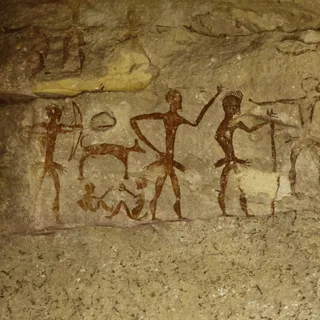Since the beginning of time, ancient art has played a crucial role in human society. The beliefs, values, and experiences of different cultures throughout history are reflected in it. We are still enthralled and inspired by the works of past civilizations. The purpose of this article is to give a thorough examination of ancient art, its importance, and the classic works that have endured.
The Importance Of Historical Art
An insight into the lives of our predecessors can be gained through ancient art. It is more than just ornamentation; it maintains cultural heritage, recounts tales, and sends messages. Ancient art has been essential to human expression, from elaborate sculptures to cave paintings.
Cultural Introspection
The ideals and ideologies of its day are reflected in ancient art. Ancient Egypt’s complex hieroglyphics, for example, provide valuable insight into their social structure and religious beliefs. In a similar vein, Greek sculptures reflect the ideals of their culture by emphasizing beauty, humanism, and the celebration of the human form.
Historical Records
Historical documents can be found in many old works of art. They shed light on ancient peoples’ everyday routines, traditions, and customs. We may learn about trade, social organization, and technological progress from artifacts like pottery, tools, and clothing that have been discovered in archeological sites.
Emotional Bond
Through art, individuals may connect across time and space and experience emotions. Looking at an antique work of art can take us back in time and give us a glimpse into the minds and emotions of the artists. Ancient artcano inspires wonder and devotion, whether it is through the majesty of a Roman monument or the simplicity of a prehistoric cave painting.
Important Ancient Civilizations and Their Contributions to Art
Egypt in antiquity
Tomb Paintings and Hieroglyphics
Perhaps the most well-known aspects of ancient Egyptian art are its intricate tomb paintings and hieroglyphics. These works of art have both utilitarian and religious functions. They emphasized the significance of the afterlife in Egyptian culture by portraying images of everyday life and assisting the departed in the afterlife.
Monuments and Statues
The Great Sphinx and pharaoh statues are examples of Egyptian sculptures that demonstrate their belief in the king’s divine right. These colossal works demonstrate their profound regard for their monarchs in addition to their artistic prowess.
Greek antiquity
Traditional Sculpture
The Greeks are renowned for their sculpting innovations. Lifelike figures that conveyed beauty and emotion were produced by artists such as Phidias and Praxiteles. The Parthenon, with its magnificent sculptures and friezes, is a representation of ancient Greece’s architectural genius.
Ceramics
Greek ceramics are yet another important contribution. It frequently incorporates elaborate patterns and mythological motifs for both functional and aesthetic reasons. The different types, such h red-figure and black-figure pottery, show how artistic processes have changed over time.
Rome in antiquity
Frescoes and Mosaics
Roman art is distinguished by its use of frescoes and mosaics. These colorful paintings, which featured images from everyday life, nature, and mythology, graced the walls and floors of both public and private structures. Magnificent frescoes at Pompeii’s Villa of the Mysteries offer a window into Roman rites and family life.
Buildings
With its focus on majesty and technical mastery, Roman architecture has left a lasting impression. Their expertise in concrete and arch construction is demonstrated by buildings like the Pantheon and the Colosseum, which will have an impact on architectural styles for years to come.
China in antiquity
Calligraphy & Painting with Ink
Chinese calligraphy and ink painting are well-known forms of art. These artistic mediums place a strong emphasis on the expression of emotions and the beauty of brushwork. In China, calligraphy is regarded as one of the highest art forms and is frequently combined with philosophy and poetry.
Ceramics and Pottery
Chinese ceramics, especially porcelain, are prized for their artistry and beauty. Ancient Chinese skills influenced societies well beyond their boundaries and established the groundwork for ceramic arts around the world.
Ancient Art’s Timelessness
Durable Impact
Modern art and culture have been greatly influenced by ancient art. Ancient methods, topics, and styles have served as sources of inspiration for artists throughout history. For instance, the art of ancient Greece and Rome had a direct influence on the Renaissance’s resurgence of classical ideas and aesthetics.
Preservation Activities
The preservation of historic art remains a top priority. All around the world, museums and other organizations work to preserve and present these gems. Technological developments like digital archiving and 3D scanning are also aiding in the preservation of great works of art for upcoming generations.
Modern Art’s Reinterpretation
Ancient subjects are frequently reinterpreted by contemporary artists using contemporary approaches. We can see old art from a modern perspective thanks to this fusion, which opens a dialogue between the past and present. Artists such as Ai Weiwei and Kehinde Wiley push boundaries and challenge perceptions by incorporating parts of old art into modern works.
Ancient Art’s Future
The study and enjoyment of ancient art will continue to change as time goes on. Some ancient monuments and artworks may be in danger due to issues including urbanization, climate change, and cultural changes, yet awareness and activism are rising. Governments, organizations, and communities working together can help preserve these priceless gems.
Conclusion
The inventiveness and expressiveness of humans are demonstrated by ancient art.Exposing the values, ideas, and experiences of earlier civilizations, gives us a window into the past. We pay tribute to the legacy of our predecessors as we continue to discover and enjoy these classic works of art. We can guarantee that the stories of ancient art will be told for many years to come by comprehending and conserving them.
Also Read: Alineaciones de 1. FC Düren contra Bayern Munich
FAQs About Ancient Artz
Ancient art: what is it?
The term “ancient art” describes the artistic creations made by many societies overtime before the Middle Ages. This comprises works of architecture, sculpture, painting, and ceramics that capture the spirit, values, and way of life of those cultures.
What is ancient art significant?
Because it documents history and displays the ideals and ideologies of earlier societies, ancient art is significant. It enhances our knowledge of human history by shedding light on their everyday routines, social institutions, and creative endeavors.
Which ancient works of art are there?
The Egyptian pyramids, Greek sculptures, Roman mosaics, and Chinese ink drawings are a few examples of ancient art. These all serve as symbols of the distinctive aesthetics and cultural ideals of their separate societies.
What impact has ancient art had on contemporary art?
Modern art has been impacted by the subjects, methods, and aesthetics of ancient art. Classical concepts have been revived and reinterpreted in current circumstances as a result of Renaissance and modern artists’ inspiration from earlier styles.
How is the preservation of ancient art being approached?
The creation of museums, restoration initiatives, and the application of technologies like digital archiving and 3D scanning are all examples of preservation activities. These programs seek to preserve historic pieces of art so that future generations can enjoy them.






2 thoughts on “Ancient Artz: Exploring the Timeless Beauty and Cultural Legacy”